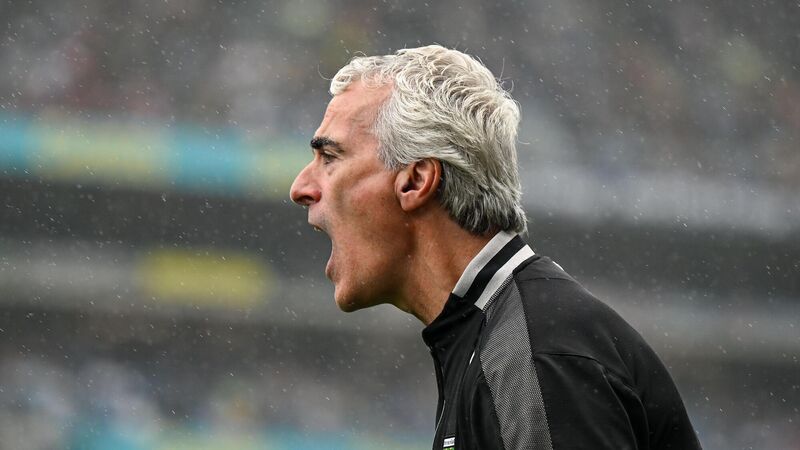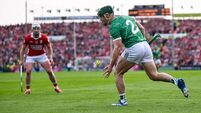Tommy Martin: Jim McGuinness is a superhero, but are Kerry his Kryptonite?

SUPERHERO: Donegal manager Jim McGuinness during the GAA Football All-Ireland Senior Championship quarter-final. Pic: David Fitzgerald/Sportsfile.
The last time they met in an All-Ireland final, I remember the exact moment I knew Donegal would lose to Kerry.
It wasn’t when Paul Geaney scored Kerry’s first goal within 60 seconds of the throw-in, or in the 52nd minute when Donegal keeper Papa Durcan kicked the ball straight to Kieran Donaghy for Kerry’s second goal or deep into injury time when Colm McFadden slapped the ball onto the base of the Kerry post for what would have been the equalising goal.
It was three weeks before that, when the final whistle blew on the now-legendary mugging of Dublin in the semi-final. The elation of that moment; the big blue giant lying bleeding on the ground; the execution of the gameplan; the sheer, magnificent audacity of it – it felt like there no more worlds to conquer.
And then that horrible feeling. Ah shit, there’s no way they’re going to win the final now.
The hope was that Jim McGuinness would know this: that he and his team had spent all their emotional capital on conjuring and implementing the plan to beat the unbeatable. Using his superhero manager utility belt (deploy sports psychology grapple hook!) he would figure out a way to get the players right.
But it didn’t happen. They were flat three weeks later and they were playing Kerry, for whom Croke Park on All-Ireland final day is a place of work, not a tourist attraction. They did a number on Donegal, who watched all their hard work slip away in slow motion like a bad dream.
When his book came out the next year, these feelings were confirmed. The bit about Dublin in 2014 reads like the plot of Oppenheimer: endless painstaking preparation that led to one big, earth-shattering bang.
McGuinness details the hours spent poring over video to decipher the code of Stephen Cluxton’s kickouts, how Dublin’s half-backs pushed forward and their full-backs marked from the front, how to address the fact that they always seemed to have runners coming through and so many options to choose from in attack, how they pushed up on your kickouts, and then the Eureka moment when he figured it all out.
He had it all ready to go before Donegal had even made the semi-final. On the bus home from the quarter-final win over Armagh, he told his travelling companions: “I know what they are about. I know what they are going to do and how they are going to do it. And that’s all you need to know.”
After all that they must have put into beating the Dubs, there is the sense of the actual final as an anti-climax. “I got this odd feeling in the dressing room,” McGuinness wrote, “that we were a little bit quiet in ourselves. People were just a bit subdued…that mood carried through to the field. It was plain to see. Our intensity was missing. We looked lethargic and burdened.”
It is embarrassing to admit now, but I do remember, mixed in that bitter soup of disappointment you feel after an All-Ireland final defeat, a sense of let-down towards McGuinness. How could he let this happen? He was the all-seeing, all-knowing one. The spiritual leader and great disruptor – a cross between the Dalai Lama and Mark Zuckerburg.
Now it was if he was the Wizard of Oz, exposed as a normal human man operating behind a curtain using circus tricks. How could the Dublin miracle be followed by this? It was like David Copperfield making the Statue of Liberty disappear, then putting diesel in his petrol tank on the way home.
Of course, this dose of myth-busting was probably healthy. He’s not the Messiah; he’s just a very good football manager. Not that he didn’t lean into the magical, mystical stuff. His book was called Until Victory Always – the slogan associated with Cuban revolutionary leader Che Guevara – and is peppered with stuff about energies and ghostly presences. He still evokes the slight sense of the cult leader.
But he’s a bit older and greyer now and is fine and cranky about this and that in his post-match interviews, presumably because like the rest of us he knows more as time goes on that life is struggle. It means that you approach this final with a healthier state of expectation, knowing that it will be a keenly fought contest between two well-drilled teams, rather than the feeling of being a primitive tribe hoping for some divine intervention from the Great Jim in the sky.
And there’s the sense that if Jim McGuinness is a superhero, then maybe Kerry are his Kryptonite. Reading back on his account of 2014 now, it’s striking how little credit he gives Kerry. For all that Éamonn Fitzmaurice is credited with a tactical masterplan for that horrible game, he claims nothing they did surprised him. It was all about his team’s failure to perform.
But if part of McGuinness’ success is in the aura he projects for his own side and the opposition, this Sunday he faces the county least susceptible to that kind of stuff. Yes, Donegal dismantled them in the quarter-final in 2012, but in the 2014 final there was a sense of a bit of manners being put on the upstarts. The sheer mechanical focus of Kerry on their utilitarian gameplan that day spoke of how All-Irelands are about taking care of business for them, to hell with the Maharishi in the opposition dugout.
This week, McGuinness said that winning an All-Ireland was the best day of your life, but losing it is the worst. Imagine how that day in 2014 has burned since. Has he planned for this the way he planned for Dublin back then? For a decade he walked in the wilderness (professional soccer, the Irish Times, Sky Sports) and now he is returned. He’s not the Messiah, but it would be some Second Coming.



